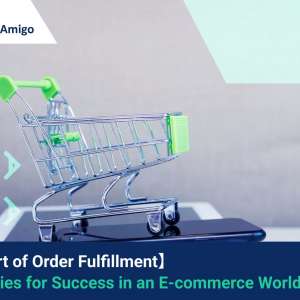Author Name: Tiffany Lee – Marketing Analyst at FreightAmigo
Introduction to fintech and its impact on the logistics industry
The logistics industry has long relied on traditional methods to manage the movement of goods and materials. However, with the advent of fintech, the landscape is rapidly changing. Fintech, or financial technology, refers to the use of technology to deliver financial services. In the context of logistics, fintech is revolutionizing the way businesses manage their supply chains, improve efficiency, and streamline operations.
Fintech solutions in logistics encompass a wide range of technologies, including cloud computing, big data analytics, artificial intelligence, and blockchain. These technologies enable logistics companies to automate processes, track shipments in real-time, optimize inventory management, and facilitate seamless payments and transactions. The result is a more efficient and transparent logistics ecosystem that benefits businesses and consumers alike.
Want To Compare The Best Express, Air Freight, Sea Freight, Rail Freight & Trucking Rates So As To Have Better Control On Cost?
Traditional logistics vs tech-driven logistics
Traditional logistics processes often involve manual paperwork, phone calls, and a lack of real-time visibility. This can lead to delays, errors, and inefficiencies. In contrast, tech-driven logistics leverage fintech solutions to streamline operations and improve overall efficiency.
For example, cloud-based logistics platforms provide a centralized system that allows businesses to manage their supply chains from anywhere, at any time. This eliminates the need for physical paperwork and allows for real-time collaboration between different stakeholders. Additionally, big data analytics can be used to analyze vast amounts of data to identify trends, optimize routes, and improve forecasting accuracy. This level of automation and data-driven decision-making was not possible with traditional logistics methods.
The role of fintech in enhancing supply chain efficiency
Fintech plays a crucial role in enhancing supply chain efficiency by improving visibility, reducing costs, and increasing operational agility. With the help of fintech solutions, logistics companies can track shipments in real-time, monitor inventory levels, and optimize routes to minimize transportation costs.
One of the key ways fintech enhances supply chain efficiency is through the use of Internet of Things (IoT) devices. These devices, such as sensors and RFID tags, can be attached to shipments to provide real-time data on their location, condition, and temperature. This enables logistics companies to proactively manage potential issues and make informed decisions to ensure the timely delivery of goods.
Another area where fintech improves supply chain efficiency is through the automation of manual processes. For example, automated inventory management systems can track inventory levels, generate purchase orders, and manage stock replenishment automatically. This eliminates the need for manual data entry and reduces the risk of human errors.
Fintech solutions for inventory management and tracking
Inventory management is a critical aspect of logistics operations, and fintech solutions have greatly improved this process. With the help of fintech, businesses can now track their inventory in real-time, automate replenishment, and optimize storage space.
One fintech solution for inventory management is the use of RFID technology. RFID tags can be attached to individual items or pallets, allowing for easy identification and tracking. This enables businesses to accurately monitor their inventory levels, reduce stockouts, and improve order fulfillment.
Another fintech solution for inventory management is the use of cloud-based inventory management systems. These systems provide a centralized platform where businesses can track their inventory, manage stock levels, and generate automated reports. This streamlines the entire inventory management process and improves overall efficiency.
Streamlining payments and transactions with fintech in logistics
Traditionally, payments and transactions in the logistics industry have been complex and time-consuming. However, fintech has revolutionized this process by introducing innovative payment solutions and streamlining transactions.
One fintech solution for streamlining payments in logistics is the use of mobile payment apps. These apps allow businesses to make payments on the go, eliminating the need for physical checks or cash. Additionally, mobile payment apps provide real-time transaction updates and notifications, improving transparency and reducing the risk of errors.
Another fintech solution for streamlining transactions is the use of blockchain technology. Blockchain is a decentralized ledger that records transactions in a transparent and secure manner. In logistics, blockchain can be used to create smart contracts, which automate and enforce the terms of agreements between different parties. This reduces the need for intermediaries and streamlines the entire transaction process.
The rise of blockchain technology in logistics and its benefits
Blockchain technology is rapidly gaining traction in the logistics industry due to its numerous benefits. Blockchain provides a secure and transparent platform for recording and verifying transactions, eliminating the need for intermediaries and reducing the risk of fraud.
One of the key benefits of blockchain in logistics is improved traceability. With blockchain, each transaction or movement of goods is recorded on a shared ledger, providing an immutable and transparent history of the entire supply chain. This enables businesses to track the origin and movement of goods, verify authenticity, and ensure compliance with regulations.
Another benefit of blockchain in logistics is increased efficiency. Blockchain can automate and streamline processes such as contract execution, payment reconciliation, and customs documentation. This saves time, reduces paperwork, and eliminates the need for manual intervention, resulting in faster and more efficient operations.
Fintech startups disrupting the logistics industry
The logistics industry is no stranger to disruption, and fintech startups are at the forefront of this wave of innovation. These startups are leveraging fintech solutions to challenge traditional logistics models, improve efficiency, and provide new services to businesses and consumers.
One example of a fintech startup disrupting the logistics industry is Flexport. Flexport is a digital freight forwarder that uses technology to simplify the shipping process. With its cloud-based platform, businesses can easily manage their shipments, track their cargo in real-time, and access transparent pricing and documentation.
Another example is Convoy, a digital freight network that connects shippers and carriers through its online platform. Convoy uses data-driven algorithms to match available trucks with shipments, optimizing routes and reducing empty miles. This not only improves efficiency but also reduces fuel consumption and greenhouse gas emissions.
The future of fintech in the logistics landscape
The future of fintech in the logistics landscape is bright, with new technologies and innovations on the horizon. As technology continues to advance, logistics companies can expect more sophisticated fintech solutions that further enhance efficiency, reduce costs, and improve overall operations.
One area of future development is the use of artificial intelligence (AI) in logistics. AI can be used to automate and optimize various aspects of logistics operations, such as demand forecasting, route optimization, and risk assessment. This will enable logistics companies to make data-driven decisions and respond quickly to changing market conditions.
Another area of potential growth is the use of drones and autonomous vehicles in logistics. These technologies have the potential to revolutionize last-mile delivery, reducing costs and improving delivery speed. Fintech solutions can play a crucial role in enabling the seamless integration of drones and autonomous vehicles into the logistics ecosystem.
Conclusion
Fintech is reshaping the logistics landscape, transforming traditional processes into tech-driven solutions that improve efficiency, transparency, and customer satisfaction. From inventory management and tracking to streamlining payments and transactions, fintech has revolutionized the way logistics companies operate.
As fintech continues to evolve, logistics companies can expect even more innovative solutions that further enhance supply chain efficiency and reduce costs. The rise of blockchain technology and the emergence of fintech startups are just the beginning of a new era in logistics.
To stay ahead in this rapidly changing landscape, businesses should embrace fintech solutions, explore partnerships with fintech startups, and invest in the development of their own technology capabilities. By doing so, they can position themselves for success in the tech-driven logistics industry of the future.
There Are Different Options For Cargo Transportation. If You Want To Choose The Most Convenient And Suitable Solution, It Is Best To Have The Full Support Of Logistics Experts! If You Are Planning To Ship Goods Overseas, Please Go To The FreightAmigo Page For Inquiries.
===
Read More:
Creating A Sustainable Business: The Power Of ESG Engagement And Stakeholder Collaboration
【Future is Green】 Embracing Sustainable Packaging and Logistics for a More Eco-friendly World
===
If you have any inquiries on logistics/supply chain, feel free to contact FreightAmigo now:
Chat with us online OR
Phone : +852 28121686
WhatsApp: +852 27467829









































